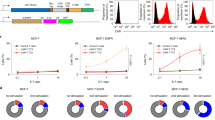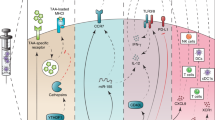Abstract
Fusion of tumor cells with antigen-presenting cells (APCs) has been proposed for the preparation of cancer vaccines. However, generation of these hybrids, using physical or chemical methods such as electrofusion or polyethylene glycol (PEG), has been difficult to standardize. Characterization of cell fusion has also been problematic because of difficulties in differentiating fusion from cell aggregation, leakage of cellular dyes and dendritic-cell (DC) phagocytosis of tumor material. In this report, we describe a new method to generate hybrid cell vaccines, based on gene transfer of a viral fusogenic membrane glycoprotein (FMG) into tumor cells, and incorporate a genetic method by which true hybrid formation can be unambiguously detected. We describe a new class of tumor cell–DC hybrid that can be rapidly isolated after cell fusion. These hybrids are highly potent in in vitro antigen presentation assays, target lymph nodes in vivo and are powerful immunogens against established metastatic disease.
This is a preview of subscription content, access via your institution
Access options
Subscribe to this journal
Receive 12 print issues and online access
$209.00 per year
only $17.42 per issue
Buy this article
- Purchase on Springer Link
- Instant access to full article PDF
Prices may be subject to local taxes which are calculated during checkout





Similar content being viewed by others
References
Walden, P. Hybrid cell vaccination for cancer immunotherapy. Adv. Exp. Med. Biol. 465, 347–354 (2000).
Trefzer, U. et al. Hybrid cell vaccination for cancer immune therapy: first clinical trial with metastatic melanoma. Int. J. Cancer 85, 618–626 (2000).
Kikuchi, T. et al. Results of a phase I clinical trial of vaccination of glioma patients with fusions of dendritic and glioma cells. Cancer Immunol. Immunother. 50, 337–344 (2001).
Koido, S., Tanaka, Y., Chen, D., Kufe, D. & Gong, J. The kinetics of in vivo priming of CD4 and CD8 T cells by dendritic/tumor fusion cells in MUC1-transgenic mice. J. Immunol. 168, 2111–2117 (2002).
Wang, J., Saffold, S., Cao, X., Krauss, J. & Chen, W. Eliciting T cell immunity against poorly immunogenic tumors by immunization with dendritic cell-tumor fusion vaccines. J. Immunol. 161, 5516–5524 (1998).
Trefzer, U., Herberth, G., Sterry, W. & Walden, P. The hybrid cell vaccination approach to cancer immunotherapy. Ernst Schering Res. Found. Workshop 30, 154–166 (2000).
Trefzer, U., Weingart, G., Sterry, W. & Walden, P. Hybrid cell vaccination in patients with metastatic melanoma. Meth. Mol. Med. 35, 469–475 (2000).
Bateman, A. et al. Fusogenic membrane glycoproteins as a novel class of genes for the local and immune-mediated control of tumor growth. Cancer Res. 60, 1492–1497 (2000).
Diaz, R.M. et al. A lentiviral vector expressing a fusogenic glycoprotein for cancer gene therapy. Gene Ther. 7, 1656–1663 (2000).
Linardakis, E. et al. Enhancing the efficacy of a weak allogeneic melanoma vaccine by viral fusogenic membrane glycoprotein-mediated tumor cell-tumor cell fusion. Cancer Res. 62, 5495–5504 (2002).
Bateman, A. et al. Viral fusogenic membrane glycoproteins kill solid tumor cells by non-apoptotic mechanisms which promote cross presentation of tumor antigens by dendritic cells. Cancer Res. 62, 5466–6578 (2002).
Vile, R.G. et al. Tissue specific gene expression from Mo-MLV retroviral vectors with hybrid LTRs containing the murine tyrosinase enhancer/promoter. Virology 214, 307–313 (1995).
Diaz, R.M., Eisen, T., Hart, I.R. & Vile, R.G. Exchange of viral promoter/enhancer elements with heterologous regulatory sequences generates targeted hybrid long terminal repeat vectors for gene therapy of melanoma. J. Virol. 72, 789–795 (1998).
Lanzavecchia, A. & Sallusto, F. Regulation of T cell immunity by dendritic cells. Cell 106, 263–266 (2001).
Tsujimoto, H., Nishizuka, S., Redpath, L.J. & Stanbridge, E.J. Examination of the oncogenic potential of H19 gene in HeLa x normal human fibroblast hybrid cells. Int. J. Oncol. 19, 89–95 (2001).
Stanbridge, E.J. Suppression of malignancy in human cells. Nature 260, 17–20 (1976).
Fielding, A.K. et al. A hyperfusogenic gibbon ape leukaemia envelope glycoprotein: targeting of a cytotoxic gene by ligand display. Hum. Gene Ther. 11, 817–826 (2000).
Bateman, A. FMG: a cancer gene therapy. Thesis, Open Univ. (2002).
Hogquist, K.A. et al. T-cell receptor antagonistic peptides induce positive selection. Cell 76, 17 (1994).
Altman, D.G. Analysis of survival times. in Practical Statistics for Medical Research (ed. Altman, D.G.) 365–395 (Chapman and Hall, London, 1991).
Morgenstern, J.P. & Land, H. Advanced mammalian gene transfer: high titre retroviral vectors with multiple drug selection markers and a complementary helper-free packaging cell line. Nucl. Acids Res. 18, 3587–3596 (1990).
Acknowledgements
We thank T. Higgins for expert secretarial assistance. This work was supported by National Institutes of Health grants RO1 CA85931, RO1 CA094180 and P50 CA91956; AstraZeneca; the Mayo Foundation; and the Université Libre de Bruxelles.
Author information
Authors and Affiliations
Corresponding author
Ethics declarations
Competing interests
The authors declare no competing financial interests.
Rights and permissions
About this article
Cite this article
Phan, V., Errington, F., Cheong, S. et al. A new genetic method to generate and isolate small, short-lived but highly potent dendritic cell-tumor cell hybrid vaccines. Nat Med 9, 1215–1219 (2003). https://doi.org/10.1038/nm923
Received:
Accepted:
Published:
Issue Date:
DOI: https://doi.org/10.1038/nm923
This article is cited by
-
Towards personalized, tumour-specific, therapeutic vaccines for cancer
Nature Reviews Immunology (2018)
-
Cell fusion in tumor progression: the isolation of cell fusion products by physical methods
Cancer Cell International (2011)
-
Generation of highly pure fusions of colorectal carcinoma and antigen-presenting cells
Langenbeck's Archives of Surgery (2010)
-
Autologous versus allogeneic peptide-pulsed dendritic cells for anti-tumour vaccination: expression of allogeneic MHC supports activation of antigen specific T cells, but impairs early naïve cytotoxic priming and anti-tumour therapy
Cancer Immunology, Immunotherapy (2008)



